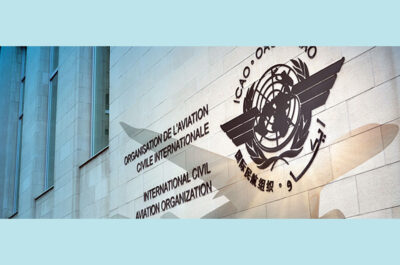
On the occasion of the 70th anniversary of Bolivia’s General Directorate of Civil Aeronautics, the President of the ICAO Council, Dr. Olumuyiwa Benard Aliu (right), presented a Council President Certification to the President of Bolivia, Dr. Juan Evo Morales Ayma, in recognition of Bolivia’s progress on the effective implementation with ICAO Standards and Recommended Practices (SARPs). Compliance with ICAO SARPs is key to accessing the international civil aviation network. Photo credit: Jose Lirauze.
ICAO’s 13th Traveller Identification Programme (TRIP) Strategy Symposium is seen as an important step in maintaining the global momentum on anti-terrorism priorities recently achieved through the United Nations Security Council (UNSC).
MONTREAL – The fight against international terrorist and criminal movements took another step forward this week, as experts and senior officials gathered for ICAO’s 13th Traveller Identification Programme (TRIP) Strategy Symposium.
“The ICAO TRIP strategy reinforces the global line of defence against international terrorist movements, cross border crime, and the many other threats to the safety and security of civil society and international aviation,” stressed ICAO Secretary General Dr. Fang Liu in her opening address to the event.
“The main part of our work in this area is conducted under Annex 9 to the Chicago Convention, on Facilitation. Facilitation activities are strongly supportive of the UN Sustainable Development Goals (SDGs), and the ICAO TRIP Strategy also significantly contributes to UN Security Council Resolutions 2178 and 2309.”
The world’s foremost travel document and identity management event, this latest edition of the TRIP Symposium is seen as an important step in maintaining the global momentum on anti-terrorism priorities recently achieved through the United Nations Security Council (UNSC).
Dr. Liu presented an aviation security brief to the UN Security Council this September, having also been invited to its Counter-Terrorism Committee (CTC) meeting in July of 2017. Along with enhanced screening and security checks, the CTC has highlighted the important role of airlines in tracking the global movement of higher risk passengers.
“Specifically, the CTC recognized the importance of national authorities sharing advanced passenger information (API),” Dr. Liu noted. “And while many States have not yet introduced related API programmes, I would like to remind them all that API sharing became mandatory under ICAO Annex 9 as of 23 October this year.”
2017 TRIP Symposium sessions provided participants with new insights into latest screening and risk-based security measures, while stressing the importance of partnerships and capacity-building as States work to shore up their respective lines of defence.
“States’ implementation of the TRIP strategy requires coordinated action between many government and industry entities,” Dr. Liu commented, “but we are also aware that TRIP implementation capacities vary from government to government. ICAO and States are addressing this gap by fostering cooperation among both States and industry, intensifying coordination at regional and local levels, and by mobilizing donor contributions.”
The extended TRIP planning and implementation guidance needed by States was further addressed at the event through the launch of ICAO’s TRIP Compendium. The new and comprehensive reference document showcases related initiatives by partners such as the United Nations Office on Drugs and Crime (UNODC), INTERPOL, the European Union, the Organization for Security and Cooperation in Europe (OSCE), and the International Organization for Migration (IOM), while further collating a range of additional ICAO guidance material.
The 2017 TRIP Symposium coincided with two important ICAO workshops on its Public Key Directory (PKD) and new approaches to API, side-events conducted in partnership with the United Nations’ Counter-Terrorism Committee Executive Directorate (UNCTED) and other international organizations. Panama has recently become the 59th State to take advantage of the PKD’s encrypted validation, which maximizes the benefits of ePassport security, but Dr. Liu stressed that ICAO expects to see greater buy-in the months ahead.
“Although more than 80 per cent of the ePassports in global circulation are issued by States already participating in the PKD, many are still not taking advantage of it to authenticate the chip-based data,” she reiterated.
The 2017 TRIP Symposium was centred around the theme of “Making Air Travel more Secure and Efficient”, reflecting the fact that well-designed security technologies also support the improvement of the passenger experience and the efficiency of facilitation processes more generally.
“It is only by ensuring both of these priorities in a balanced way that our proposed solutions will be truly sustainable,” Dr. Liu concluded.
While benefitting from the event and its workshops, 2017 TRIP Symposium participants also enjoyed a wide-ranging exhibition showcasing the latest industry technology and process innovations. The event gathered close to 600 officials from 82 States and 14 international organizations and will conclude at ICAO.
President of ICAO Council and President of Bolivia affirm importance of progress on compliance and air transport development
Pointing to the crucial contributions of ICAO compliant connectivity to sustainable socio-economic development, the President of the ICAO Council, Dr. Olumuyiwa Benard Aliu and the President of Bolivia, Dr. Juan Evo Morales Ayma, affirmed the need to continue the progress that led to Bolivia’s achievement of an ICAO Council President Certificate. With Bolivia’s Representative on the ICAO Council, Mr. Javier Garcia Soruco, in attendance, Dr. Aliu presented the Certificate personally to President Morales Ayma on Thursday.
The presentation of the certificate took place at the celebrations of the 70th anniversary of Bolivia’s General Directorate of Civil Aeronautics. The Certificate was awarded in recognition of Bolivia’s significant progress on the effective implementation with ICAO Standards and Recommended Practices (SARPs), which is key to accessing the international civil aviation network. The criteria used to identify the recipients of these certificates are objective and transparent, and are based on the results of ICAO’s Universal Safety Oversight Audit Programme Continuous Monitoring Approach activities.
In bilateral talks, both leaders underscored the importance of encouraging the sustainable development of international air connectivity as a crucial lever for socio-economic development. President Morales Ayma highlighted investment at Santa Cruz Airport and his vision of Viru Viru airport’s development as a regional hub as examples of his Government’s commitment. Dr. Aliu stressed ICAO’s full support of these efforts through the UN agency’s No Country Left Behind initiative. He recalled that the cooperation established through this initiative reflects the spirit and intent of the 1944 Convention on International Civil Aviation that established ICAO, of which Bolivia was one of the original signatories.
“It has been the great legacy of ICAO to serve as the focal point for the international cooperation which has made aviation what it is today, and it is Bolivia’s great legacy to have been involved in that work since the very beginning of the modern aviation era,” Dr. Aliu remarked. “Looking forward, ICAO will continue to guide the future of air transport at the service of States and in partnership with industry. We will be counting on the partnership of countries like Bolivia as we do, fully confident that our shared commitments will keep air transport an essential and sustainable network at the service of all mankind.”
Dr. Aliu’s mission also provided an opportunity for high-level meetings with Bolivia’s Minister of Foreign Affairs, Mr. Fernando Huanacuni Mamani and Minister of Transport, Mr. Milton Claros Hinojosa. These meetings focussed on the identification of specific areas of focus for the technical and regulatory improvement of Bolivia’s air transport sector and operations. Dr. Aliu’s guidance was well received by the Ministers, who accepted the crucial importance of pursuing progress given the particularly strong socio-economic benefits of air connectivity to land-locked developing countries such as Bolivia.
The President of the ICAO Council was accompanied in Bolivia by the Director of ICAO’s Technical Cooperation Bureau, Mr. Ivan Galan and ICAO’s Acting Regional Director for the South American Region, Oscar Quesada. His mission took place from 25 to 27 October 2017.
Tatiana is the news coordinator for TravelDailyNews Media Network (traveldailynews.gr, traveldailynews.com and traveldailynews.asia). Her role includes monitoring the hundreds of news sources of TravelDailyNews Media Network and skimming the most important according to our strategy.
She holds a Bachelor's degree in Communication & Mass Media from Panteion University of Political & Social Studies of Athens and she has been editor and editor-in-chief in various economic magazines and newspapers.














































































































































































